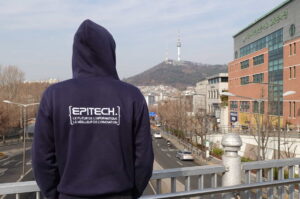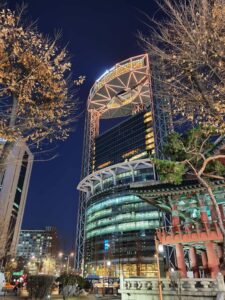At Epitech Technology, during their fourth year, all the students get to experience studying abroad in one of our 100 partner universities located around the world. The first students of Epitech Brussels are currently spending their international year in Seoul, at one of the most renowned universities in South Korea and in the world – Chung-Ang University. Its diverse academic program offers students the opportunity to push their technical skills in the field of virtual reality, amongst others. Quite convenient for our Brussels students whose final year project – TORII – is precisely a work and communication tool that allows collaborators to meet in virtual reality and exchange on projects in an environment similar to the real world. After a semester of study, we approached Julien Stuckens, Oscar Zumbrunn and Joshuel Kuilwijk, to get feedback on their experience in Seoul.
What made you choose South Korea as your fourth-year destination?
Joshuel Kuilwijk: What made me choose Korea as a destination was its culture, which is very different from the Belgian culture. As I have not traveled much in my life, I wanted to experience something completely different.

Julien Stuckens: I discovered Korean culture at the beginning of my years at Epitech via k-pop and TV series. Korea quickly became one of the destinations I wanted to explore the most with my friends and classmates. But what really helped me decide was the opportunity Epitech gave me to visit Seoul in 2020. From that moment on, I became even more attached to the Korean language and culture.
Oscar Zumbrunn: Indeed, we were all curious about Asian cultures and this country seemed to us a very good point of initiation.
How are you adjusting to an educational environment other than Epitech?
OZ: The academic environment at Chung-Ang is very similar to what you would find in any normal educational institution in France or Belgium. It reminds me a bit of my high school years. Therefore, I didn’t necessarily have to readjust.
JK: For me, the adjustment is going pretty well. It’s good to see a more “traditional” university environment. It’s a nice change.
JS: Going back to a more “classical” teaching style, as opposed to the project-based pedagogy offered by Epitech, was very refreshing. I still had to get used to it though. Nevertheless, the spirit of self-learning that I developed at Epitech helps me a lot to think further during the theoretical courses.

Is this experience abroad what you expected?
JK: I had already done a lot of research before I came to South Korea, but I was still surprised by a lot of things that I discovered on site.
OZ: Academically yes, I knew what to expect. But culturally no. There are many more small family markets and restaurants than I imagined. The architecture is quite eclectic and varies greatly from house to house. In the vibrant centers of Seoul, some of the buildings are really amazing.
JS: I was fortunate to receive feedback from older students who had already studied in Korea. This has given me a sense of what to expect overall. However, Chung-Ang’s curriculum varies from year to year in order to keep up with technology. This year’s classes focus on the “Metaverse“, a topic that is very much in the news right now and, moreover, we are very passionate about.
How do you think studying abroad will affect your professional future?
OZ: By studying abroad for a year, you learn the preferences of the local society. It helps to know in which part of the world you can develop this or that market.
JK: It’s obvious that Seoul is a city very much focused on technological innovations. Seeing so much Virtual Reality everywhere in stores, malls and during my classes convinced me even more to work in this field that I was already interested in before coming to this country.
JS: Working in Asia has always been a possibility I envisioned for my future. In the past, I was able to do an internship in China for 6 months. This new experience in South Korea allows me to learn more about technology and working in Asia. In addition, I have developed a real appreciation for the Korean language over the months. I plan to continue learning Korean after my stay and eventually use it professionally.
What does this experience bring to you beyond the technical skills you are expected to acquire at Chung-Ang University?
JK: This stay in Seoul brought us a lot of things. We were able to discover a different culture and meet new people, both Koreans and people from all over the world. Studying abroad is definitely a good opportunity to grow.
JS: In addition to the technical courses, Chung-Ang University has a variety of general courses such as Korean culture and business management. All these courses are actually very complementary to our technical knowledge. They contextualize the need for our skills and how we can apply them.
Is the stay in Seoul going well despite the pandemic? How does it influence your experience in Korea?
OZ: Unfortunately, because of the pandemic, all the classes are online. This is a shame because one of the things I wanted to experience in Korea was the student life on campus. Without that, it’s much harder to make contacts.
JK: Indeed, I would have liked to have had a traditional campus life, but the curfew and all the other health restrictions make it difficult.
JS: Thanks to the good management of the pandemic in Korea, we still had the opportunity to move there at the beginning of the school year though. Other fourth-year Epitech students were less lucky than us. Indeed, our dreams of discovery were limited. However, the situation is moving towards a reopening. Some professors are already preparing face-to-face classes for the next semester. We hope that the situation will continue to improve because it would completely change our experience abroad.